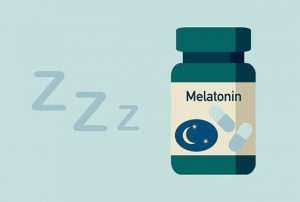Here is everything you need to know about melatonin
What is Melatonin Hormone?
Melatonin is a natural hormone produced by the pineal gland in the brain; it is also found in other parts of the body, including the gastrointestinal tract. Melatonin is also known as the “sleep hormone.” It is produced by the brain and is in charge of the timing of your circadian rhythm (also known as your sleep-wake cycle), as well as playing an important role in helping you fall asleep, stay asleep, and wake up.
Melatonin hormone
Because this hormone is secreted in response to darkness, it is known as the hormone of darkness. Normally, our bodies produce more melatonin at night. Hormone levels rise in the evening and fall in the morning as the sun rises. The pineal gland is less active during the day, but as darkness falls or during the night, the pineal gland becomes active and produces melatonin, which is released into the blood. Melatonin levels in the blood remain elevated for approximately 12 hours – all night. Melatonin is known as the “Dracula of hormones” because it only appears in the dark.
What is melatonin and how does our body produce Melatonin?
Melatonin is a natural hormone that is secreted at night and assists you in falling asleep. Light has an effect on melatonin production. The retina (a layer of tissue within the eye) processes light and sends it to the pineal gland in the brain. Melatonin is then secreted into the bloodstream by the pineal gland. Melatonin is transported from the brain to the rest of the body via the circulatory system.
Melatonin hormone function
Consider melatonin to be your body’s “night mode.” When the body’s cells are not exposed to melatonin, they are in “day mode.” Melatonin is in charge of making us sleepy at night and less tired during the day. Melatonin production is stimulated by light, so the more light we are exposed to, the less melatonin we secrete, whereas darkness stimulates melatonin production.
Melatonin function and its impact
Melatonin’s primary role in humans has been studied in terms of sleep and wakefulness. Nocturnal melatonin levels peak between the ages of one and three years old, plateau in early adulthood, and then gradually decline in later adulthood. A 70-year-old, for example, will have only a quarter of the melatonin levels of a young adult. The fact that melatonin levels decline with age may be one of the reasons that newborns and toddlers require many more hours of sleep per night than elderly adults. However, melatonin may play a variety of roles in humans, many of which are unknown. Melatonin has anti-inflammatory, antioxidant, and anticoagulant (clot-preventing) properties, according to research.
Melatonin supplement for sleep
When there is darkness, your pineal gland produces the most melatonin, and when there is light, it produces less melatonin. In other words, you have low levels of melatonin in your blood during the day and high levels of melatonin at night. The longer the night, the more melatonin your pineal gland secretes. Melatonin is often referred to as a “sleep hormone” as a result of this. While melatonin is not required for sleep, having the highest levels of melatonin in your body allows you to sleep better. Several other factors, however, influence your body’s ability to sleep and the quality of your sleep.
Because your pineal gland receives information about the daily light-dark (day-night) cycle from your retinas and then releases melatonin accordingly, people who can’t detect light usually have irregularly synchronized melatonin cycles, which leads to circadian rhythm disorders. Other natural melatonin effects are its beneficial interaction with female hormones in the body. It has been shown in studies to aid in the regulation of menstrual cycles. Pineal melatonin can also protect against neurodegeneration or the progressive loss of neuron function. Neurodegeneration is present in diseases such as Alzheimer’s and Parkinson’s diseases. Researchers discovered that people who had their pineal gland surgically removed (pinealectomy) aged more quickly. As a result, some scientists believe natural melatonin may have anti-ageing properties.
Natural sources of Melatonin
1. Goji Berries
Goji berries appear to be a recent discovery, but they have been used for thousands of years in China and other parts of Asia. Goji berries contain high levels of melatonin, which not only regulates sleep patterns but also lowers triglycerides, a type of fat found in the blood. Cherries, for example, help people control their weight and lower levels of ‘bad’ LDL cholesterol while increasing levels of ‘good’ HDL cholesterol. They are typically sold dried, similar to raisins, and are delicious with cereal, muffins, soups, and mashed sweet potatoes. They can also be eaten on their own.
2. Pomegranates
Pomegranates are well-known for their tough, red husks and interiors, which contain hundreds of small, gleaming red seeds. Salads, glazes, relishes, syrups, and liqueurs, as well as jams and jellies, are made from the seeds. Pomegranates are often turned into a juice that is not too sweet or tart because many people find eating the seeds to be somewhat fiddly. Aside from melatonin, these fruits are high in dietary fibre, particularly when the seeds are consumed. The oil in the seeds contains nutrients such as stearic, oleic, and linoleic acid.
3. Bananas
Bananas, a fruit that comes in its own convenient package, are well-known for their potassium content, but they are also high in melatonin. A ripe banana contains approximately 1.85 nanograms of melatonin per gramme. Besides the relaxing effect of melatonin, the potassium and magnesium in a banana relax the muscles. This also aids in sleep.
4. Tart Cherries
The distinction between tart and sweet cherries extends beyond their taste. Both reduce inflammation, relieve muscle soreness after workouts, regulate blood pressure, and relieve arthritis pain. They also increase ‘good’ or HDL cholesterol levels. They are high in nutrients like vitamin C, potassium, and polyphenols, as well as dietary fibre. Tart cherries, on the other hand, have been shown in studies to be higher in antioxidants. These are chemicals that shield the body from free radical molecules, and melatonin is both an antioxidant and a hormone. Tart cherries contain about 2.06 nanograms of melatonin per gram. Eating them also helps people sleep better, though the effects take longer than they do with sweets.
5. Walnuts And Almonds
Nuts and seeds contain numerous vitamins and minerals, including magnesium, omega-3 fatty acids, and vitamin E. Melatonin is also abundant in walnuts and almonds. One gram of walnuts contains approximately 3.5 nanograms of melatonin. This makes walnuts and almonds ideal for preventing jet lag when traveling from one time zone to another. Because nuts and seeds are high in fat, they should be consumed in moderation. Because almonds are high in magnesium, which aids in sleep, they enhance the sleep-inducing properties of melatonin.
Benefits of Melatonin
1. Powerful antioxidant
Melatonin stimulates the production of antioxidant enzymes in the body, which protect the body from oxidative stress and help mitochondria function. Its potent action prevents cellular atrophy while also protecting against toxins that can disrupt mitochondrial function, resulting in a variety of neurodegenerative diseases (these are diseases caused by the progressive damage of nerve cells.)
2. Boosts Immunity
Melatonin aids in immune function. It fortifies your body’s defenses against infections, diseases, and premature ageing symptoms. Because of its potent anti-inflammatory properties, it can also act as a stimulant in immunosuppressive diseases.
3. It Reverses Circadian Rhythm Sleep Disorders
Melatonin has the ability to alter biological clocks. As a result, it can be used to treat a variety of circadian rhythm sleep disorders, including advanced and delayed sleep phase disorders, jet lag, and shift-work disorder.
4. It Benefits Heart Health
Melatonin has cardioprotective properties. Its powerful anti-inflammatory and antioxidant properties can aid in the prevention of heart attacks and strokes. Because of its free radical scavenger activity, it is an excellent natural alternative for treating and preventing cardiovascular diseases.
5. Lowers Blood Pressure
Melatonin also has an anti-hypertensive effect, which helps to keep blood pressure in check. Melatonin can be used as supportive therapy in hypertensive patients because it acts favourably on different levels of hypertension, including organ protection, and has few side effects.
6. Improve Thyroid Function
The thyroid can become sluggish as we age, which is where melatonin’s protective abilities come into play. Melatonin therapy can improve thyroid function and treat mood disorders in menopausal women.
7. Treat PMS
Melatonin therapy can help you treat symptoms of PMS during your menstrual cycle’s luteal phase. It can also be used to treat the symptoms of perimenopause and menopause in older women. Melatonin’s ability to treat infertility in both men and women is supported by scientific evidence.
8. Improves Gut Health
Melatonin is also produced by the stomach and is required for proper digestion. Melatonin can be a natural treatment for digestive issues such as ulcers, stress-induced stomach damage, and stomach inflammation. It has been shown to be effective in treating colitis, IBS (irritable bowel syndrome) and even some cancers.
9. Migraine Prevention and Treatment
If migraines are interfering with your life, melatonin supplements can help reduce the frequency and severity of these painful, incapacitating attacks. Melatonin at 3 mg is effective for migraine prevention. It may also help with the treatment of cluster headaches.
10. Improves Eye Health
Melatonin promotes healthy vision by preventing the death of cone cells, which aid in colour identification. It also improves the function of vision-critical nerve cells and protects the cells that produce eye pigment. It can also reduce glaucoma-related eye pressure and prevent the death of nerve cells in the eye.
Plix Life is a Mumbai-based company that has mastered the art of delivering good health in a palatable way! Its product for improving your sleeping pattern ‘Deep Sleep Mini Mints’ is powered with melatonin and ayurvedic herbs like Jatamansi that synergistically work to help you get better sleep, feel more relaxed and tackle stress in a better way.
FAQs
1. What Is melatonin?
Melatonin is a hormone that the body produces naturally and releases into the bloodstream when exposed to darkness. When this happens, the melatonin hormone tells the brain it’s time to sleep. The natural melatonin hormone is heavily influenced by light, time, and the body’s biological clock. Our melatonin hormones are frequently disrupted by lifestyle practices such as an overnight job or a disruption in our sleep patterns. Thankfully, melatonin supplements can help keep this important hormone in check.
2. Why should I consume melatonin tablets or supplements?
Millions of people suffer from sleep disorders ranging from insomnia to jet lag to Circadian Rhythm Disorder, and melatonin is a natural way to combat these issues and get a good night’s sleep. Melatonin is also beneficial to people who need a little extra help falling asleep.
3. Are melatonin supplements for sleep safe for consumption?
Melatonin is completely safe. There have been no confirmed cases of melatonin toxicity or overdose. If you have any questions about what dosage is best for you, you could consult your doctor and get more clarity on the dosage.
4. Who all can benefit from melatonin consumption?
Melatonin is beneficial to a wide range of people for a variety of reasons. The three most common types of people who benefit from melatonin supplements are as follows:
Individuals suffering from jet lag
People who have a sleep disorder
Individuals frequently do not feel sleepy when they should
5. Is there a possibility that I get addicted to melatonin?
Melatonin is not habit-forming or addictive.
6. What is the dosage of melatonin that I must consume?
Melatonin researchers have not determined the optimal doses for different users. Individual dosages will vary depending on the type of sleep disorder and metabolism. Melatonin is typically available in doses ranging from 1 to 10 mg, and larger doses are not necessarily more effective than smaller doses. Most people under the age of 60 are content with taking 1 to 3 mg for a few weeks at a time until their natural sleep cycle is restored. If you feel tired in the morning, you should reduce your dosage. If you continue to have difficulty falling asleep and staying asleep, your dose may need to be increased. Individuals aged 65 and older typically require the highest potency, around 10 mg of melatonin.
7. Can my kid consume melatonin?
Melatonin is safe for children to consume with the approval of a pediatrician or sleep specialist. Melatonin may or may not be a good option for a child depending on their age, dosage, and underlying sleep issue. You may speak with a healthcare professional before giving melatonin to a child to ensure that the supplement is safe and effective. Melatonin is most commonly used in children with ADHD (Attention Deficit Hyperactivity Disorder), sleep disorders, visual impairment, Autism, or other developmental disabilities, according to research
8. What distinguishes Plix Deep Sleep Mini Mints from other market-available products?
The majority of sleep supplements and products on the market only contain Melatonin. While melatonin is important, Plix’s Deep Sleep Mini Mints also contains the Ayurvedic herb Jatamansi, which promotes stress relief and relaxation, and aids in better sleep.
9. Is there a possibility of side effects of using Deep Sleep Mini Mints?
Because Deep Sleep is made entirely of natural ingredients, it can be used indefinitely without causing dependency or any known risk of side effects.















